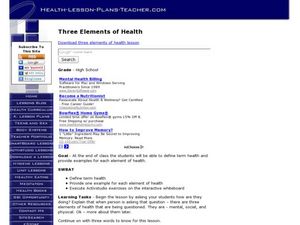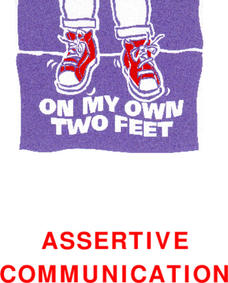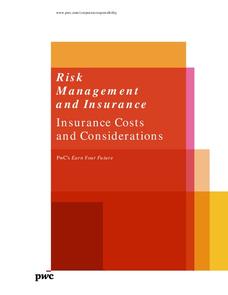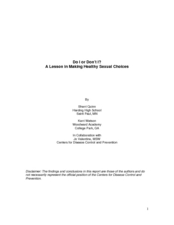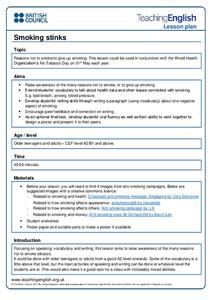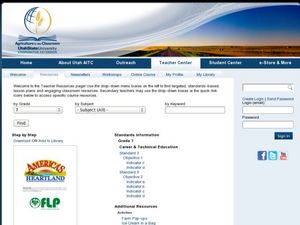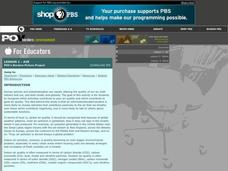Texas Center for Learning Disabilities
Second and Third Grade Explicit Phonics Intervention
Support all young learners on their journey to literacy with this five-lesson reading intervention unit. Following a clearly outlined format, each lesson first engages children in practicing their phonemic awareness and phonics skills...
TeenMentalHealth
Know Before You Go Teacher’s Guide
A 124-page guide provides instructors with what they need to know before launching a seven-lesson thematic unit designed for high school seniors on issues they will face after graduation. Topics covered include mental health and...
Scholastic
Consider the Source
Who is more trustworthy when it comes to marijuana: a high school student, or The National Institute on Drug Abuse? Sources matter when reading informational text. Help teenagers discern which facts are true with an activity that focuses...
Scholastic
Marijuana: Perception of Harm vs. Use
Many teenagers don't believe that marijuana is harmful, but if they do, it affects whether they use it or not. Analyze the relationship between what high school seniors believe about marijuana and their tendency to use it with a reading...
University City High School
Metabolism Lesson Plan
Not a lesson in the traditional sense, this is a collection of resources with which you can craft a lesson on metabolic processes. It includes an outline of topics, some brief discussion, and a large array of animations, images, and...
Curated OER
Youth Obesity: Schools Fight Back
Kids fight obesity by comparing the USDA food intake suggestions to what they personally consume throughout the day. They watch a video, read texts, and explore related vocabulary which they use as they compose an oral presentation.
Curated OER
Skin Cancer Lesson Plan
Skin care is a topic often overlooked in the health curriculum. This should not be the case because most types of skin cancer can be prevented, or if detected early enough, can be successfully treated. So take the time to teach your...
Curated OER
Three Elements of Health
High schoolers identify and discuss three important elements of health: physical, social, and mental health. They go into detail about each and spend a lot of time discussing the dangers of smoking, drinking alcohol, and eating a...
Advocates for Youth
Who Am I and What Can I Do?
Knowing yourself is a great start to getting through high school! A series of activities introduce individuals to the rest of the group as they share their backgrounds, their interests, and their goals in life.
PBS
Stories of Painkiller Addiction: Prescription Drug Abuse Awareness Campaign
The I-STOP law was designed to regulate the distribution and tracking of prescription drugs. After reading an article about its signing and implementation, middle and high schoolers work together to come up with their own ideas for an...
Department of Education (Ireland)
Assertive Communication
Assertive communication is an acquired skill. Teaching young people to ask for what they need and to believe that they have a right to ask is at the core of a unit on assertive communication. Over the course of the unit, middle and high...
Department of Education (Ireland)
Understanding Influences
"Understanding Influences," a richly detailed, carefully scaffolded unit, asks middle and high school scholars to examine how internal and external factors like friends, media, and society influence their attitudes and behaviors.
PricewaterhouseCoopers
Risk Management and Insurance: Insurance Costs and Considerations
Compare the different types of insurance with high schoolers, and have them learn the benefits and costs of medical, auto, and home policies. The resource addresses what makes some insurances more costly and what teenagers can do to find...
Curated OER
Do I or Don't I? A Lesson in Making Healthy Sexual Choices
Learners role play scenarios about making smart sexual choices. In this health lesson, students discuss the consequences of sexual decisions they make when they are teens. They analyze how these can affect their future and the people who...
Florida Department of Health
Understanding the Risk of Substance Abuse Unit
Teenage brains are different! Understanding that the teenage brain is still developing and thus more impacted by substance abuse is the key concept in a three-lesson high school health unit. Participants learn about how the brain and...
Nemours KidsHealth
Self-Esteem
It's important to have healthy self-esteem, but it't not always easy for a teen to identify and maintain it. Support your pupils' healthy self-esteem through grand conversations, daily positive self reflections, and scenario problem...
British Council
Smoking Stinks
There are lots of good reasons not to smoke. Make sure your middle and high schoolers understand each and every one with a lesson plan that prompts them to read anti-smoking posters, note the main points, and write a short response on...
True Blue Schools
Now, We’re Cooking!
Practice nutritional cooking with a collection of fun meal preparation lessons. Each lesson includes a focus, objective, collaborative activity, and recipe to culminate what young cooks have learned about healthy eating.
Curated OER
School Lunches Get More Healthful
Pupils read a story called School Lunches Get More Healthful and answer vocabulary and comprehension questions about it. For this current events school lunch lesson plan, student respond to literature by answering questions, recalling...
Curated OER
America's Heartland: Step-By-Step Lesson Guide
An excellent resource gets kids looking at agricultural production to better understand the careers needed in distributing foods from the farm to the consumer. Book, poster, web, and video links are included for teacher use. There is...
Curated OER
P.O.V.'s Borders Picture Project: Lesson 1 - Air
Take photos of human activities that impact air quality. Collaborative groups present one of the photographs, identifying how the activity contributes to air quality and what can be done to minimize the impact. As one in a series of...
Curated OER
Is This Really Okay for Me? A Public Health Statistical Analysis
Future public health consultants are asked in a letter to help determine if a fictitious drug is causing birth defects in a population. They perform a simulation using beans and probability calculations to come to a conclusion. Note that...
PBS
Stories of Painkiller Addiction: Myth or Fact
Are opioids the most abused drug after marijuana? How hard is it for young people to obtain painkillers without a prescription? Middle and high schoolers explore the growing epidemic of opioid addiction with a lesson that prompts them to...
PBS
Stories of Painkiller Addiction: Learning About Opioids
Feeling high is not the only side effect of abusing prescription opioids. Middle and high schoolers learn more about specific painkillers, including Fentanyl, Oxycodone, and Clonazepam, as well as their common brand names and extensive...









